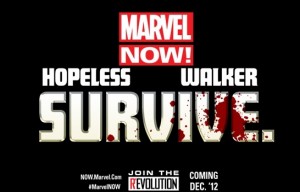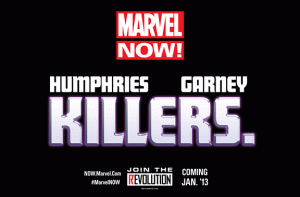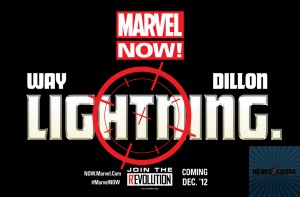
The Thin Line Between Editorial Content and Ads
November 2nd, 2012 by david brothers | Tags: comics, marvelOne of the weird things about writing about comics (or comics journalism or entertainment journalism or whatever this quagmire is called) is that you have to walk the fine line between advertising or marketing someone else’s work and actually creating meaningful content outside the restraints of an economic exchange. I’m fine with “Buy this book!” benefitting someone else, as long as the route I take to tell you to buy it agrees with me. For me, that’s long dumb essays about how cool Carrie Kelly is. For others, it’s something else.


These are advertisements for advertisements of upcoming series that Marvel sent out to all or most of the comics sites. They’re teasers for upcoming advertisements and announcements.
They’re also information-light. You get two names and a buzz word. They’re intended to hype up the fanbase… which makes me realize that comics marketing and advertisement (toward a certain segment of the fanbase) is largely accomplished by way of the press. You don’t see ads for Captain America comic books on TV — you check CBR or ComicsAlliance, where you’ll find stuff like this. Comics sites even post solicitations, which are essentially the thing that retailers use to order their comics. It’s catalog content.
This is the part of comics journo that I don’t want any part of, mainly because they’re such a blatant advertisement. There’s no content here to discuss, only the barest slip of info that makes you think about a series you weren’t previously thinking about.
I’m not really down with unlettered previews, either. They don’t feel like “look at this great art from _____” so much as “this series still exists and is coming soon!” But even with unlettered previews, if you know what you’re doing, you can spin those into something worth checking out. You can provide content outside of “this exists.” You can talk about the technique, the past history of art on a book, the artist’s prior work and how that will influence her work on this new comic, or even just dig into the storytelling and see what material you can squeeze out.
You can provide context is what I’m saying, and as writers-about-comics, that’s something we should be good at and do whenever possible. We need to be able to explain what something means beyond just “this exists and you can buy it.”
But if you look at one of those teasers up there, “this exists and you will be able to buy it” is as far as you can go, or at least as far as most people went. “Daniel Way and Steve Dillon are working on something to do with the word lightning. What could it be? Could it be Thunderbolts-related, since their slogan is ‘Justice, like lightning!’?” is… worthless, as a news piece? What does it mean, other than being a lead-in for a post a week later that says “Yup, it’s T-bolts! Here’s a cover!”

It’s advertising.
I’m blessed enough to be in a position where I can be a prima donna and pick and choose what I write about. I don’t think this stuff, these advertisements masquerading as editorial material, is very conducive to a healthy press or audience. It’s kind of emblematic of how eager the press is for access (we’ll post whatever you send us, even if there’s no real info attached!) and how willing the publishers are to game the system. We should be better, on both sides, because there is absolutely nothing that will be lost by being better, outside of blind obedience. An informed audience is never a bad thing, and treating them like they want to be informed is also never, ever a bad thing. Kick down some information or hidden context. Ignore series that are announced with the artist to be determined. Change the game. You can still tease with info that people can talk about, instead of blindly speculate about, without blowing the reveal.
When you’re covering this stuff, don’t stop at “this exists.” Take it a step further. Look at what you can say about it, rather than just reporting on it. What does it say, what does it mean, what does it do? If the answer’s nothing, is it worth posting?
My problem isn’t even with the teasers in and of themselves. They’re pretty effective, in terms of generating conversation. It’s that the press released them like they were actual news, instead of advertisements. Comics journo doesn’t have an ombudsman, so the lines between editorial and advertisement can get muddy. We need to be better at discernment, rather than posting everything that passes through our inbox. “No, thanks,” isn’t an insult.
Don’t let anyone take advantage of your enthusiasm. I’m willing to help you move a few units and get the word out if your work speaks to me on some level, and if not me, someone else will. That’s how comics journalism works, basically, and that’s okay. But there are better ways to do that than these teasers.

When you say “advertisements for advertisements”, are you saying that it’s more or less an ad trying to sell you on future ads for the product? I feel like that’s something that would be either 1) a “shit’s fucked up” indicator in some dystopian future story or 2) a one-off gag in Futurama.
@Johnny: Bingo. They’re teasers heralding the arrival of an announcement.
I think probably the best thing about these teasers/advertisements is that the only real information we have are the creative teams, and none of them are particularly good/interesting creative teams.
@John McAree: What are you talking about, I’m soooo excited to see what Sam Humphries has up his sleeve for…what’s he writing again?
This post beautifully encapsulates why I just don’t bother with so much of “enthusiast media.” And I know that probably sounds goofy, considering I myself write stuff for the enthusiast media. But so much of the secret to news media success, be it 24-hour cable channels or websites, depends on the need for updates. Constant updates, on a consistent basis. Updates every few minutes. Read a page worth of updates and hit Refresh, get an entirely new page or two. That’s the target.
Of course, as it turns out the default state of things is such that there isn’t REALLY that much “breaking news.” But those updates still need to happen. So it is that the doorway to “Press Release=News Update” is thrown wide open. And yeah, you COULD (and should) bookmark the reprinting of the press release with some editorializing or disclaimer…but that takes TIME.
Comics journalism is just one piece of this phenomenon. Movie “news” sites are at the point where they will post updates announcing the release date of a teaser. Iterate that logic as far down the “Trace Buster BUSTER” line as you can stomach, and they’re doing it…because it works. That’s what most people want: quantity of content in short, rapid bursts.
Quality of said content is mostly an afterthought, and the audience for long-form posts is…well, we’re at the point where “too long; didn’t read” doesn’t even sum up the general attitude towards it. People can’t even be bothered to write that out. Even “tl; dr” has too much punctuation and spacing. We’re currently at “tldr” as far as that goes.
It boils down to your concluding statement that “there are better ways to do that than these teasers.” Because the truth of that only depends on what defines “better.” To us, “better” is measured in terms of what engages people to have a non-superficial discussion about something. But when you define “better” by “number of ad views over a period of time” then the system as is works as desired.
For those of us who don’t know any guy named “Hopeless,” I thought Marvel was doing an adaptation of the Walking Dead… until I realized that’d be stupid.
And then there’s the ugly business-of-journalism questions of “How many clicks do these postings get?” and “If we skip them, dare we allow those readers find this content on another site?”
For me comics aren’t what they used to be. I would look at the 99 cent previews to see what was coming up, and none of it was interesting. Companies keep rebooting their comics so you can’t even invest in a character.
Most comics are only good for IP’s
🙂 @MarkPoa:
I like the advert better when I didn’t know it had peoples last names! LOL
I don’t mind these at all, they say to me “You are aware of creators and what they imply about a book, and that’s enough.” outside of comics to my dad these are noise, but they’re inside of comics, they’re Marvel embracing that their readership has some awareness of the creative process. They’re buzz-words that evoke the tone the creative team will be working under. A picture of Quicksilver with “A new series” on it tells me nothing, but if you tossed the names “Nicieza” and “Sale” and the word “Revolting” then I’m curious enough to go research this and in the process, expose myself to any additional marketting google might expose me to.